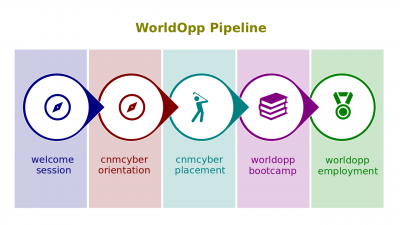|
|
| Line 8: |
Line 8: |
| | | | |
| | ===Key terms=== | | ===Key terms=== |
| − | :'''[[Task]]''' (or [[job task]]). The lowest level of [[enterprise effort]]. In [[Agile methodology]], a [[task]] is a single unit of work broken down from a [[user story]]. In [[project management]], a [[task]] is a generic term for work that is not included in the work breakdown structure, but potentially could be a further decomposition of work by the individuals responsible for that work. A [[task]] is usually completed by just one person and is a part of an [[activity]]. | + | :'''[[Working condition]]'''. The lowest level of [[enterprise effort]]. In [[Agile methodology]], a [[task]] is a single unit of work broken down from a [[user story]]. In [[project management]], a [[task]] is a generic term for work that is not included in the work breakdown structure, but potentially could be a further decomposition of work by the individuals responsible for that work. A [[task]] is usually completed by just one person and is a part of an [[activity]]. |
| − | :*[[Task identity]]. The degree to which a job requires completion of a whole and identifiable piece of work.
| |
| − | :*[[Task significance]]. The degree to which a job has a substantial impact on the lives or work of other people.
| |
| − | :*[[Task performance]]. The combination of [[effectiveness]] and [[efficiency]] at doing core job tasks.
| |
| − | :'''[[Task structure]]'''. One of Fiedler's situational contingencies that describes the degree to which job assignments are formalized and structured.
| |
| − | :*[[Structured task]].
| |
| − | :*[[Unstructured task]].
| |
| − | | |
| − | :'''[[Task attribute]]'''. <div style="background-color:#efefef; padding: 5px; margin: 15px;">
| |
| − | :*'''[[Consequence of error]]'''. How serious would the result usually be if the worker made a mistake that was not readily correctable?
| |
| − | :*'''[[Degree of automation]]'''. How automated is the job?
| |
| − | :*'''[[Freedom to make decisions]]'''. How much decision making freedom, without supervision, does the job offer?
| |
| − | :*'''[[Frequency of decision-making]]'''. How frequently is the worker required to make decisions that affect other people, the financial resources, and/or the image and reputation of the organization?
| |
| − | :*'''[[Impact on enterprise]]'''. What results do your decisions usually have on other people or the image or reputation or financial resources of your employer?
| |
| − | :*'''[[Importance of being accurate]]'''. How important is being very exact or highly accurate in performing this job?
| |
| − | :*'''[[Importance of repeating same tasks]]'''. How important is repeating the same physical activities (e.g., key entry) or mental activities (e.g., checking entries in a ledger) over and over, without stopping, to performing this job?
| |
| − | :*'''[[Level of competition]]'''. To what extent does this job require the worker to compete or to be aware of competitive pressures?
| |
| − | :*'''[[Time pressure]]'''. How often does this job require the worker to meet strict deadlines? How important is it to this job that the pace is determined by the speed of equipment or machinery? (This does not refer to keeping busy at all times on this job.)
| |
| − | :*'''[[Work schedule]]'''. How regular are the work schedules for this job and what is the number of hours typically worked in one week?
| |
| − | :*'''[[Work virtualization]]'''. The degree to which work is done remotely rather than at some specific physical location.</div>
| |
| | | | |
| | ===Script=== | | ===Script=== |
Working Conditions (hereinafter, the Lectio) is the second lesson part of the Nature of Work lesson that introduces its participants to work characteristics and related topics.
This lesson belongs to the Introduction to Employment session of the CNM Cyber Orientation. The Orientation is the second stage of the WorldOpp Pipeline.
Content
The predecessor lectio is Task Attributes.
Key terms
- Working condition. The lowest level of enterprise effort. In Agile methodology, a task is a single unit of work broken down from a user story. In project management, a task is a generic term for work that is not included in the work breakdown structure, but potentially could be a further decomposition of work by the individuals responsible for that work. A task is usually completed by just one person and is a part of an activity.
Script
- Consequence of error is the degree to which the result of an error is serious. Some of those errors cannot be readily correctable; they are attributes of some professions such as a surgeon or, no doubts, sapper. Some of those errors are both preventable and correctable, but human factors interfere both prevention and mitigation.
- For example, the Dirty Dozen of Human Factors is the twelve most common maintenance-related human factors that are responsible for the majority of incidents and accidents in aviation. Industries like nuclear power and aviation practice special training for workers to deal not only with own errors, but also the ones of worker's supervisor.
- The COVID-19 pandemic demanded physical distancing, work virtualization, and other requirements.
- Particular supervisors, employers, or industries tend to add specific work demands to employee workloads.
Work-Seller Competence is the successor lectio.
Quiz
